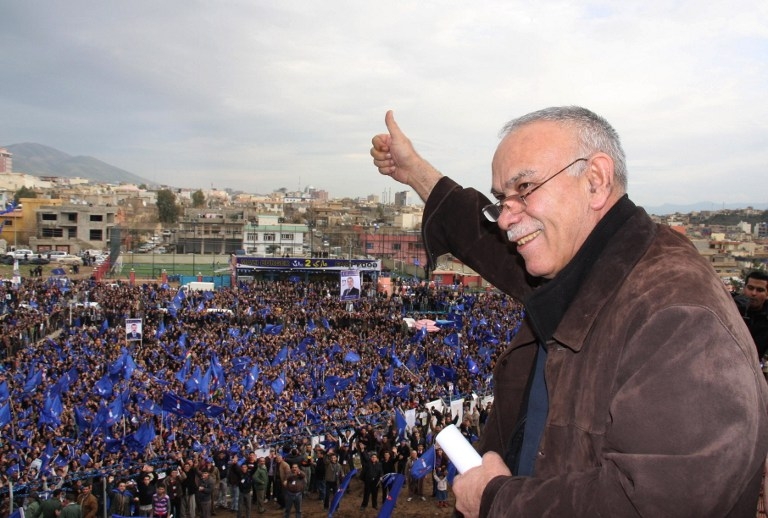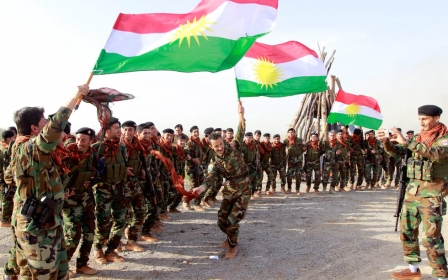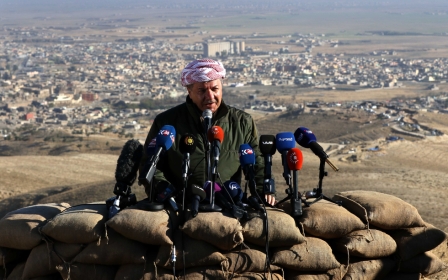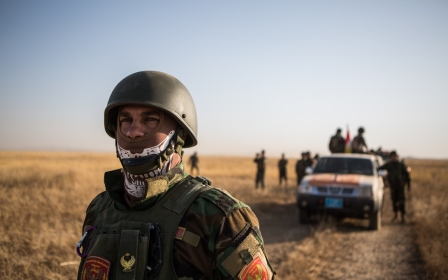Mourning, fear after death of Iraqi Kurdish opposition leader

The leader of Iraqi Kurdistan's main opposition party has died following an illness, potentially throwing up questions about the future of the region's politics.
Nawshirwan Mustafa, 73, a veteran Kurdish political and military commander, and leader of the progressive Gorran movement, died early on Friday morning after returning to Kurdistan from a medical trip in London.
“With deep sorrow, the great fighter and leader of our nation Nawshirwan Mustafa passed away at 8:00 a.m. today on May 19, 2017 after a long struggle with illness,” official Gorran media said in a statement.
News of his death was greeted with condolences from the president of the Kurdistan Regional Government (KRG), long-time rival Massoud Barzani.
Nawshirwan had been one of the co-founders of the Patriotic Union of Kurdistan (PUK) in 1975, and led the party's Peshmerga forces in attacks on the Ba'athist Iraqi government, then led by Saddam Hussein.
'Nawshirwan Mustafa was the most liberal and democratic leader in Iraqi Kurdistan and he was the only leader who could challenge Massoud Barzani'
- Abdulla Hawez, analyst
He was instrumental in formulating the plan that eventually led to the 1991 uprising in Iraq Kurdistan and the establishment of a de facto autonomous Kurdish region, protected by a US no-fly zone. This eventually led to the official recognition of the KRG in 2005 following the overthrow of Saddam Hussein.
However, despite initial economic prosperity in Iraqi Kurdistan, the growth in corruption in the PUK and Kurdistan Democratic Party (KDP) coalition government eventually led Mustafa to form the Gorran movement - also known as Movement For Change - in opposition to the government.
The party's popularity grew the to extent that it surpassed the PUK as the second largest party in parliament, and has repeatedly won the majority of votes in the liberal stronghold of Sulimaniyah, particularly among the young and those angry with government corruption. Although Gorran agreed to join a coalition government in 2013 - a move reportedly opposed by the Nawshirwan - the party has remained a critical voice.
"Nawshirwan Mustafa was the most liberal and democratic leader in Iraqi Kurdistan and he was the only leader who could challenge Massoud Barzani," explained Abdulla Hawez, an analyst of Iraqi and regional Kurdish politics, speaking to Middle East Eye.
"With his death, Gorran's choices would become much more limited."
Former comrade Adel Murad, the leader of the PUK, hailed Nawshirwan for having "led our revolution laying the foundations for our freedom."
However, the death of Nawshirwan means the loss of Gorran's main figurehead and some have predicted the party will now face a major internal struggle over its future.
Difficulties for party
Gorran had already faced difficulties in recent years - the KRG parliament has not convened since October 2015 when riots broke out over deteriorating economic conditions, leading to a number of deaths and the burning of KDP offices. The KDP blamed Gorran for stoking the violence and expelled four Gorran ministers who had joined the five party coalition government in 2013.
In May 2016, Gorran joined its former allies the PUK in order to counter the influence of the KDP, whose leader Barzani has remained in the presidency since the region's creation and has repeatedly extended his tenure. The move was also partly seen as an attempt by the PUK to regain some of the popularity it had lost to its younger offshoot.
But the loss of Nawshirwan has led some to predict the fracturing of Gorran and possibly a loss of supporters back to the PUK. The latter's decision to issue a call for a "reunion" with Gorran in a statement after Nawshirwan's death on Friday would seem to back this up.
"I think Nawshirwan was a uniter of many different groups within Gorran, especially between the old generation who mostly split from PUK and the young generation who were mostly independent reformists," said Hawez.
"My opinion is that some of the leaders of Gorran will go back to PUK while Gorran as a party continue, but unless a strong leader emerges (which they lack now), the party will be crippled by internal differences, lose votes in the election and eventually lead more leaders to rejoin PUK and the party become a marginalised weak party."
The KRG has been particularly hit in recent years by the rise of the Islamic State group. Since 2014, a loss of funds from the central government in Baghdad and the need to boost security and absorb more than a million refugees has led to increasing instability and growing authoritarianism from the KDP.
Middle East Eye propose une couverture et une analyse indépendantes et incomparables du Moyen-Orient, de l’Afrique du Nord et d’autres régions du monde. Pour en savoir plus sur la reprise de ce contenu et les frais qui s’appliquent, veuillez remplir ce formulaire [en anglais]. Pour en savoir plus sur MEE, cliquez ici [en anglais].




